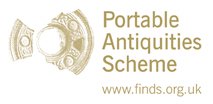Server check!
You are on the training database
Finds Liaison Officer, Lancashire & Cumbria (Part-Time) Lancashire & Cumbria
This job is no longer available, it expired on the Tuesday 30th January 2018
Salary: £ 20,138 - 23,398 GB
Job Number: LANCS09906
Location: Preston
Contract Type: Fixed Term Contract
Schedule Type:Part Time
Working Hours:18.5 per week
Salary: 20,138 - 23,398 GBP Year (Pro rata)
Closing Date: 30-01-2018
About the Role
The Finds Liaison Officer (FLO) role is key to the effective running of the Portable Antiquities Scheme (PAS) that ensures the Treasure Act is adhered to and fully observed. To this end the role has primary objectives to educate and inform regarding the Treasure Act; encourage the recognition of the archaeological importance of finds and responsible metal detector use; actively collect and upload finds data as part of the national PAS, so adding to our knowledge of the past and making this knowledge readily accessible to the public.NB this post has dual locations as their base. As the scheme is jointly operated between LCC's Museum Service and Tullie House Museum & Art Gallery in Carlisle, the post will involve significant travel within Lancashire and Cumbria. A second base is provided in Carlisle.
This position is part time, please note the salary quoted is full time equivalent. If successful the salary received will be paid on a pro –rata basis.
Key Accountabilities
Explaining the PAS to the public (eg local archaeological and historical societies, universities, schools etc), emphasising that the scheme is concerned to record all portable antiquities (not just metal objects) and presenting the data gathered.Making and keeping contact with metal-detector users and other finders in the area both through clubs and as individuals. This will include attending club meetings, representing and promoting PAS, indentifying and recording finds, encouraging clubs and finders to record their finds themselves where appropriate.
Explaining the requirements of the Treasure Act and Code of Practice and statutory provision relating to the use of metal-detectors on Scheduled Sites to finders.
Acting as expert adviser on finds of treasure in liaison with local museums and coroners and to keep finders informed of progress with their treasure cases.
Fostering and maintaining a spirit of co-operation between metal-detector users, landowners and archaeologists; educating dector users and landowners on best practice – communicating the archaeological requirements concerning the accurate recording of the provenance of finds and the need not to disturb in situ deposits and mediating between them and archaeologists/museum curators if necessary.
Explaining the aims of PAS to archaeologists and museum curators in the area and to seek their co-operation, including building a programme of visits to museums in the area on a regular basis to record finds deposited there.
Developing and undertaking outreach work that encourage greater understanding of PAS eg Finds Days and Metal Detecting Club Visits. This could include working with LCC's Heritage Learning Team or a range of external partners.
Estimating/tracking the number of detector-users active in the area and the numbers of objects that are currently being found; estimating the number and size of existing collections of objects found by metal-detector uses that are or may become available for recording.
Identification and recording of finds made by members of the public onto the PAS online database; seeking advice from Finds Advisers for those objects they are unable to identify personally.
Monitoring, maintaining and/or improving appropriate finds environment while items are in the museum’s care, liaising with professional colleagues - such as conservators - as necessary.
Recruiting, training, programming work and supervising volunteers, interns and assistants in their support and input into PAS.
Assisting in developing the PAS through active involvement in regional and national meetings, staff fora, surveys and reviews etc.
Making quarterly reports to PAS on progress in carrying out activities/objectives of the role in a timely fashion to fulfill the requirements of the scheme.
Skills and Experience
Essential:•Good degree in archaeology or a related discipline, or considerable relevant experience.
•Experience of archaeological artefact identification or working within an archaeological organisation with an emphasis on finds recording and processing.
•Awareness of issues related to metal-detecting and archaeology.
•Interest in documentation and classification systems
•Digitisation of collections including digital photography, scanning, on-line databases and interoperability
•Word processing, database and email computer systems
•Basic understanding of museum environments
•Basic understanding of conservation requirements and good practice
•Excellent communication skills, both verbally and in writing – ie ability to communicate effectively with a wide range of people including finders, archaeologists, landowners, the general public and the media
•Ability to work accurately and methodically – ie collecting data systematically, collating large amounts of information and producing quarterly reports, an annual report and other documentation to a high standard of numeracy, accuracy and clarity
•Excellent organisational and planning skills – ie working in a highly organised fashion, under pressure and to tight deadlines.
•Self-motivated
•Enthusiastic
•Flexible approach to working – ie some evening and/or weekend working will be involved to meet the needs of the role
•Ability to work alone/on own initiative and also to contribute fully to team working
•Full driving license and own transport
Desirable:
•Museums' qualification
•Museum experience including collections management – ie documentation processes for collections and collections care.
•Familiarity with/knowledge of Arts Council England Accreditation and the Portable Antiquities Scheme.
•Experience of research into and/or publication of archaeological finds
•Experience of computerised and/or online databases
•Experience of working with metal-detector users or similar groups
•Confident to work with volunteers and/or work-placement students
•Able to lift and carry items from the collection including to/from the storage areas
•Committed to access
Other LCC standard requirements:
•Commitment to equality and diversity
•Commitment to health and safety
•Display the LCC values and behaviours at all times and actively promote them in others
Other
If you would like an informal discussion or any further information please contact Susan Ashworth (01772 534064) susan.ashworth2@lancashire.gov.uk or Dr Michael Lewis FSA MCIfA (0207 323 8611)
Lancashire County Council as an equal opportunities employer intends that no job applicant or employee will receive less favourable treatment because of their age, disability, gender identity, marriage or civil partnership status, pregnancy or maternity, sex, sexual orientation, race, religion or belief unless this can be objectively justified.
Lancashire County Council has agreed a Code of Conduct and Statement of Ethical Standards that outline the behavioural and ethical standards that must be upheld by its employees and casual workers. If you are appointed, you will be required to accept these provisions on appointment.
Lancashire County Council is currently undergoing an organisational-wide transformation. All posts within the council are being reviewed as part of this organisational change. Further details will be provided at interview about the transformation and how the changes will affect you if you are successful in your application for employment.
TO APPLY: Visit this website: http://jobs.lancashire.gov.uk/details.aspx?id=Q17FK026203F3VBQB79V4F6AW&nPostingID=33074&nPostingTargetID=65010&mask=lanexternal&lg=UK
Advert went live on: Friday 19th January 2018
Advert archived on: Tuesday 30th January 2018


